- NFTs have exploded in the art world, but copyright is still a concern
- The technical process of minting, distributing, and selling such crypto-tokens involves copyright implications that aren’t being fully addressed
- Transferring an NFT does not denote any property rights associated with the art piece
- Non-Fungible Tokens depends on a hosted server, and if the hosting server shuts, the NFT will point to a dead link
- Bringing non-crypto expertise together with the development of Non-Fungible Tokens
- To solve the issues we can limit NFTs to specialized auctions
NFTs or Non-Fungible Tokens have gained mainstream attention in the world of art. The explosive rise of these digital assets has become the future of art. Such cryptocurrencies provide the ownership of an art piece on the blockchain. However, experts in the cryptosphere have noted that copyright is engaged throughout the entire process of NFT. Indeed, there is nothing inherent in the tokenization of art to ensure copyright rules. Without validation and verification of such copyright ownership, the scenario would be problematic.
Ownership concerns when it comes to NFTs
The story of blockchain development in the cryptosphere is one of the clashes against centralization and legislation. Crypto maximalists fantasize about a democratized financial world. Notably, Non-Fungible Tokens grew out of this space and share some of this tendency to decouple from established institutions.
The first issues related to NFTs are ownership. Transferring an NFT does not denote any property rights associated with the art piece. Indeed, just owning the painting does not provide any rights to make copies of the artwork.
No guaranteed ownership of the digital file
In several cases, it has been noted that owning NFTs of paintings does not provide ownership of the digital file. Rather, the NFT only contains a link to the location where the digital file resides on the internet. Moreover, to mint such crypto assets, the minter keeps a copy of the digital file and links the NFT linking the location of the file. Ultimately the file depends on a hosted server, and if the hosting server shuts, the NFT will point to a dead link.
How will the copyright concerns be solved?
Several potential solutions can help clean the copyright concerns. One of the major solutions is to bring non-crypto expertise together with the development of Non-Fungible Tokens. Doing so will lead to NFTs solutions that understand, respect, and leverage copyright principles. Notably, some firms in the industry are already working on marrying the world of copyright and cryptocurrency.
Limit to specialized auctions
On the other hand, to solve the issues we can limit NFTs to specialized auctions. Limiting NFT to controlled auctions helps the assets being curated and vetted by experts. This method will help solve the provenance problem with specialized expertise. However, the cost of accessibility for both artists and purchases will surge.
Hence, verifying and validating the copyright owner should be a part of the NFT-minting process. The technical process of minting, distributing, and selling such crypto-tokens involves copyright implications that aren’t being fully addressed. Without proper considerations, the assets have become problematic for both creators and consumers. Bringing copyright expertise will help pave the path for NFTs to reach their full potential.


 Home
Home News
News









